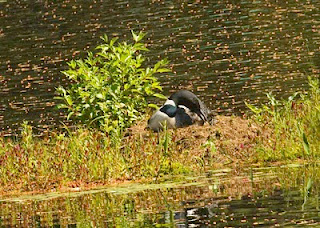I believe this year's loon nest is on the same piece of bog as the previous year, but the small piece of bog floated to a different location. I spent many wonderful hours in June and now July observing the various behaviors of the parenting loons.
Here are a few photos of my adventure. It may look like I am very close to the birds, when in fact I am well away from the nest and birds. I am using a 100- 400 mm Canon lens.
One of my first visits in early June:
The loons spent many hours taking turns sitting and turning the two eggs.
Then, in the third week of June I received a phone call from a friend. "It's George and they are off the nest swimming with the hatchling."
When I arrived one proud parent was showing its total beauty.
The chick appeared -- not two hours old and swimming. I was amazed with the total feathering out.
There was a lot of teaching going on. At one point a foot popped out of the water to keep the baby from capsizing.
The parents turned and tended the second egg for two more days .
At the end of the third week in June, the male ,female and single chick headed off to the main part of the lake. They have not returned to the nest area.
Feeding is constant throughout the day. The parents catch mostly small yellow perch, sunfish, and pickeral.
By the first of July, the chick is looking very fit.
It is amazing to see the different adaptations the chick has already learned. Grooming.... How does it do that?
Then there is the Loonyback ride...
Today is the Fourth of July and this little guy is chowing down on pickeral.
The chick is being pushed to swim faster by the parents. The parents are making him chew up more food. They catch the fish and shake it around to tenderize it. They flip the fish to the chick. He makes a shallow dive and returns with at least a mouthful.
This experience has been full of rewards. Once again, I'm learning more connections between organisms "living on the edges" of habitats.
The additional connections have been making new friends and getting reacquainted with some old friends who share similar interests in the beauty of our environment. These people watch over the nest and celebrate the loons' return year by year.













Thanks for this! How often do us readers get that close to a loon family? Amazing!! Glad to see you are back to blogging. Keep it up, please - we love seeing the world through your lens.
ReplyDeleteI check my blog feed page every day, just hoping there will be a post from you! I'm always captivated.
ReplyDeleteI plan to show this post to my class next year when loons come up. It is rare to be able to see the whole loon story like this.
I live near Highland Lake, and a wonderful group of folks who live on the lake e-mail news about our loons, who have not had a chick for a number of years now. They have been nesting this year, and I haven't heard any news as to whether we are parents this year or not. I hope so, especially since I swim at dawn most summer days and treasure the mornings the loons swim near me as they feed.
Thank you!